Polish Dependency Relation Types
The following description of Polish dependency relation types is based on the article `Polish Dependency Bank' (Wróblewska, 2012).
Contents
Arguments
comp (complement)
adjectival complements – governed by a verb form, e.g. uczynić kogoś silnymADJ (Eng. ‘to make so. strong’),
adverbial complements – governed by a verb form, e.g. zeskoczyć skądśADV (Eng. ‘to jump from somewhere’),
- nominal complements – governed by:
an adjective, e.g. pełny mlekaGEN (Eng. ‘full of milk’),
a preposition, e.g. w domuLOC (Eng. ‘at home’),
a verb form, e.g. zakończyć się sukcesemINSTR (Eng. ‘to be successful’).
a numeral, e.g. kilkaNOM tygodniGEN (Eng. ‘a few weeks’).
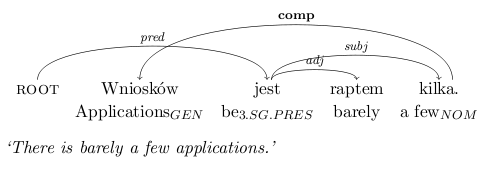
- prepositional complements – governed by:
- a verb form, e.g. czekać na (Eng. ‘to wait for’),
- an adjective, e.g. zdolny do (Eng. ‘able to, capable of’),
- an adverb, e.g. właśnie przez (Eng. ‘just by’).

comp_fin (clausal complement)
- fulfilled by a finite clause (declarative, interrogative, or exclamatory) with an internal subject,
- governed by a verb form, a subordinating conjunction or a noun.

comp_inf (infinitival complement)
- realized as a non-finite clause,
- governed by:
- a noun phrase, e.g. (mieć) prawo coś zrobić (Eng. ‘(to have) the right to do sth’),
- a verb form, e.g. chcieć coś zrobić (Eng. ‘to want to do sth’), trzeba coś zrobić (Eng. ‘it’s necessary to do sth’),
- an adjective phrase.

obj (object)
- realized as a noun phrase marked for the accusative, genitive, instrumental or even dative case,
- governed by a verb form,
- transformed into the subject in passive constructions.
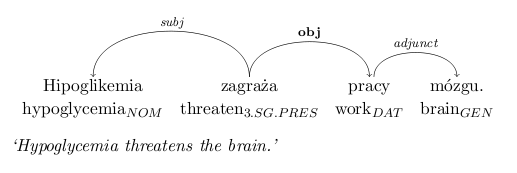
obj_th (dative object)
- fulfilled by a dative noun phrase,
- governed by a verb form,
- must fulfil the semantic role of Recipient, Experiencer, Beneficiary, etc.,
- cannot be promoted to the subject during passivisation or change its status to the object.

pd (predicative complement)
- fulfilled by any element in the predicative position in a sentence,
- governed by copula or copula-like verb forms, e.g. być (Eng. ‘to be’), stać się (Eng. ‘to become’).
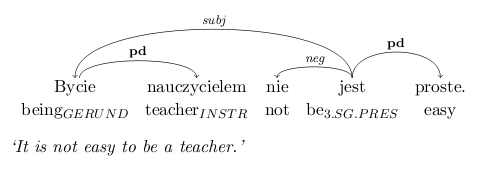
subj (subject)
- subcategorised by the sentence predicate,
- fulfilled by a noun phrase, a clause, an adjective phrase, a numeral phrase or a pro-drop pronoun,
pro is not encoded in a dependency structure.


Non-arguments
adjunct
- a non-subcategorised dependent with the modifying function,
- realized as:
- an adjective depending on a noun or a numeral,
- an adverb depending on a verb form, an another adverb,
- an adjective or a prepositional phrase,
- an attributive noun marked for genitive with a nominal or numeral head,
- a noun phrase with the temporal, locative, etc. meaning and a verbal head,
- a prepositional phrase depending on a noun, a verb, an adverb or a participle,
- a subordinate clause with a head realized as a noun, a numeral or a verb form,
- ...
app (apposition)
- realized as a noun phrase depending on an immediately preceding noun with the same meaning.

complm (complementizer)
- fulfilled by a complementizer, e.g. że, iż (Eng. ‘that’), żeby, aby, by (Eng. ‘so as to’),
- introduces a complement clause, the predicate of which is its governor,
- may be realized optionally.

mwe (multiword expression)
- Successive tokens of a multiword expression are annotated according to their linear order.
- Polish multiword expressions:
preposition-adjectival phrases, e.g. po prostuADJ (Eng. ‘simply’), co gorszaADJ (Eng. ‘what is worse’),
preposition-adverbial phrases, e.g. na pewnoADV (Eng. ‘for sure’), na zewnątrzADV (Eng. ‘outside’),
- adverb-prepositional phrases, e.g. wraz z (Eng. ‘along with’), zgodnie z (Eng. ‘in accordance with’),
- complex conjunctions, e.g. nie tylko (Eng. ‘not only’), ale także (Eng. ‘but also’), mimo że (Eng. ‘although’),
- adjective compounds, e.g. biało-czerwona (Eng. ‘white-red’).
pred (predicate)
- fulfilled by a verb form (finite verb, -no/-to-impersonal, infinitive) or a ‘main’ noun in independently annotated noun phrases,
- depends on the root node.
punct (punctuation marker)
- fulfilled by a punctuation mark, e.g. .,:;?!()”-,
- depends on the element which it delimits
abbrev_punct (abbreviation marker)
- fulfilled by a full stop,
- depends on the preceding abbreviation.
Non-arguments (morphologicaly motivated)
aglt (mobile inflection)
- fulfilled by a `mobile’ affix (verbal enclitic) marked for number, person and gender,
- depends on a verb form or a conditional clitic by appended to a verb form.
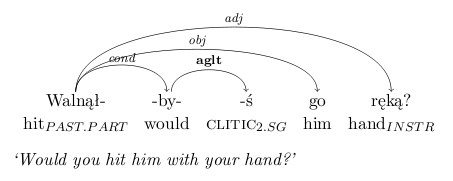
aux (auxiliary)
- fulfilled by auxiliary verbs być or zostać (Eng. ‘to be’),
- depends on the main verb form (participle, infinitive) in analytical future tense constructions, analytical past conditional constructions or passive constructions.
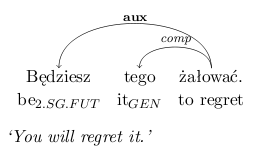
cond (conditional clitic)
fulfilled by the clitic particle by, which is appended to the verb form or appears anywhere in a sentence,
- depends on the verbal head regardless of its location.
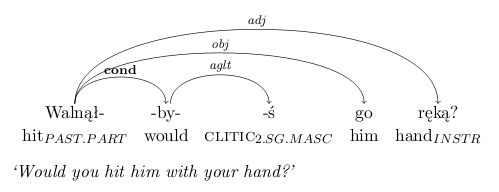
imp (imperative marker)
- fulfilled by the particle niech (Eng. ‘may’),
- depends on the main verb form in analytical imperative constructions.
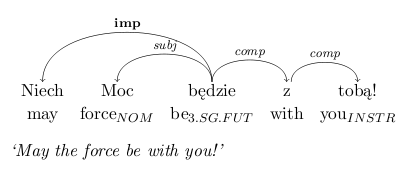
neg (negation marker)
- fulfilled by the negation particle nie (Eng. `not’),
- depends on a verbal head immediately following it.
refl (reflexive marker)
- realized as the particle się in Polish,
- depends on a verb with reflexive meaning or another verb.
Coordination
conjunct (coordinated conjunct)
- depends on a coordinating conjunction.
coord (coordinating conjunction)
- coordinates two sentences.
coord_punct (punctuation conjunction)
- coordinating element realized as a punctuation mark, e.g. comma, colon.
pre_coord (pre-conjunction)
- the first part of a two-part correlative conjunction, e.g. albo...albo... (Eng. ‘either... or...’),
- depends on the second part of the conjunction.


Classification of Polish Dependency Types
Standard vs. Language-specific Polish Dependency Types
Any questions, comments? Please send them to <alina AT SPAMFREE ipipan DOT waw DOT pl>.
